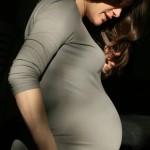The symptoms of post-natal depression may develop while a women is still pregnant, scientists now believe. One in 10 women experience the intense depression after giving birth. Most research into severe cases of the ‘baby blues’ has found the symptoms begin shortly after having a baby, with most not detected until six months after a baby is born. But a new study has found in extreme cases, the condition develops while a woman is still pregnant. For those women the depression is likely to be deeper and more severe than in those who notice symptoms after having their baby. The researchers, from the University of North Carolina (UNC), found three clinical characteristics that were most relevant in defining the condition.
These were:
* The timing of onset – whether the symptoms began during pregnancy or after birth
* The severity of symptoms, including thoughts of suicide, and a history of suffering a previous mood disorder
* Whether a woman had medical complications during pregnancy or childbirth
Each of the three has important implications for a woman’s prognosis, and the tailoring of treatments, the researchers said. Samantha Meltzer-Brody, a director at the UNC Center for Women’s Mood Disorders, said: ‘Clinicians should be aware of the diverse presentation of women with post-partum depression. ‘A thorough assessment of a women’s history is necessary to guide appropriate clinical and treatment decisions.

MOOD CHANGES, IRRITABILITY AND TEARFULNESS – THE SYMPTOMS OF POST-NATAL DEPRESSION
Post natal depression is a type of depression some women experience after having a baby. Past studies have found it can emerge within the first six weeks of giving birth, but in most cases it is not apparent until around six months. The symptoms of post-natal depression are wide-ranging. They include mood changes, irritability and episodes of tearfulness after giving birth. The symptoms are often referred to as the ‘baby blues’ and usually clear up within a few weeks. But, if they persist, it could be postnatal depression. ‘We now understand that post-partum depression can have onset of symptoms that may begin in pregnancy. ‘Improved understanding of the differences in clinical presentation of post-partum depression impacts the implementation and interpretation of screening, diagnosis, treatment, and research of perinatal mood disorders.’ The researchers studied data from more than 10,000 women collected as part of past studies. They found three clinical characteristics that were most relevant in defining the condition. The timing of onset, whether the symptoms began during pregnancy or after birth, the severity of symptoms, including thoughts of suicide, and a history of suffering a previous mood disorder as well as whether a woman had medical complications during pregnancy or childbirth, were found to be significant. And those women who experienced symptoms during their pregnancy were at risk of more severe post-natal depression than those whose symptoms began after birth. The data came from a new international research consortium PACT (Post-partum Depression Action Towards Causes And Treatment), which was founded by UNC researchers and includes more than 25 investigators in seven different countries.
This article first appeared The Daily Mail, 27 January 2015.

























suicidal thoughts|my dysfunctional family|unhappy with life|i have suicidal thoughts|unhappy life|suicidal thoughts help|i'm having suicidal thoughts|depression suicidal thoughts|epic sex fails|i'm unhappy with my life|depression negative thoughts|suici
Thanks for any other great post. The place else may just anybody get that type
of information in such a perfect way of writing?
I have a presentation subsequent week, and I am at the search for
such info.